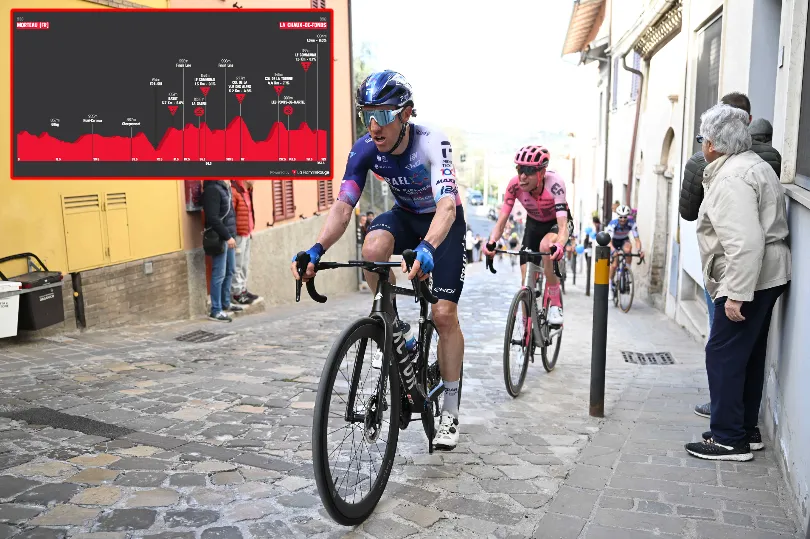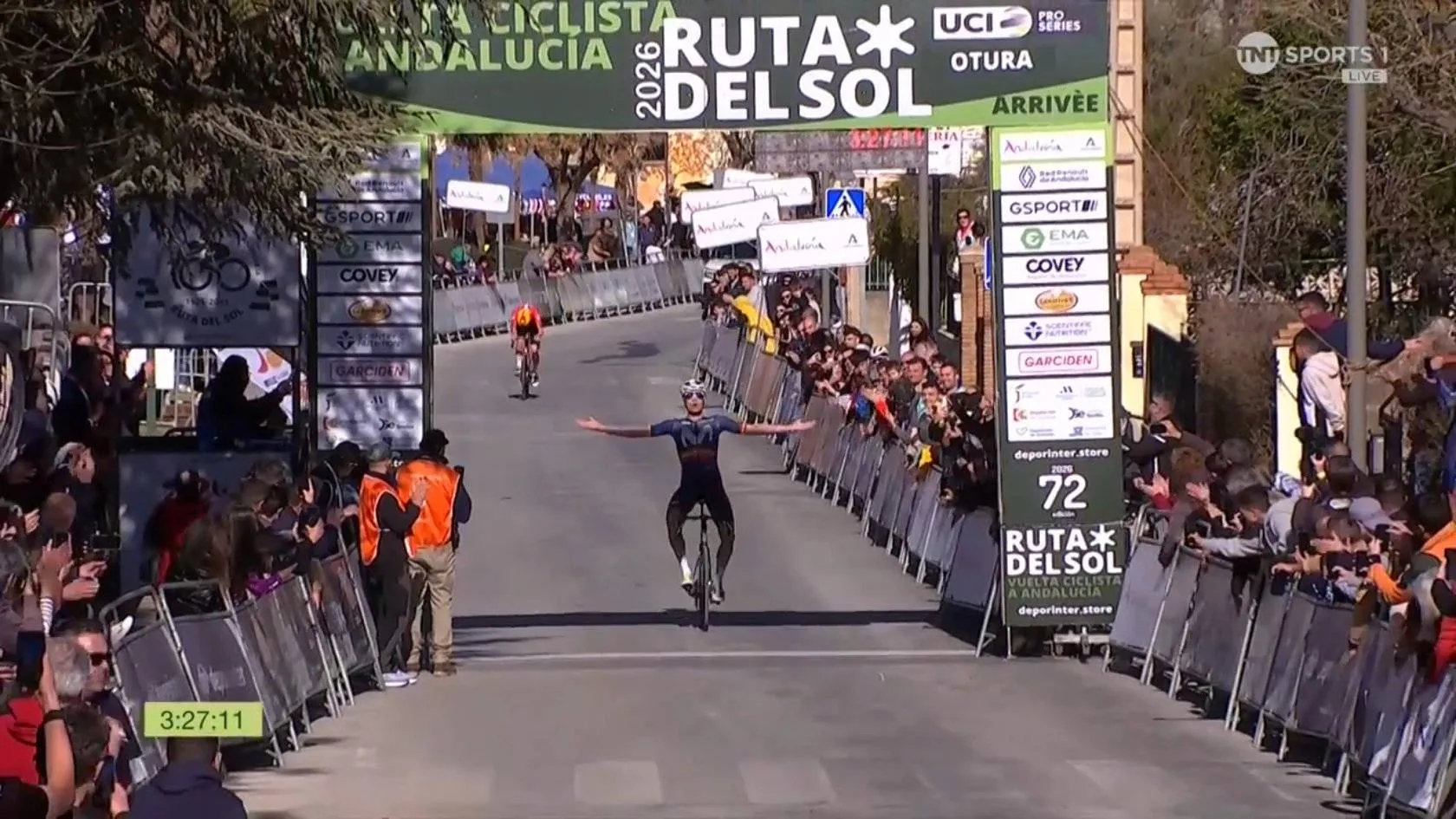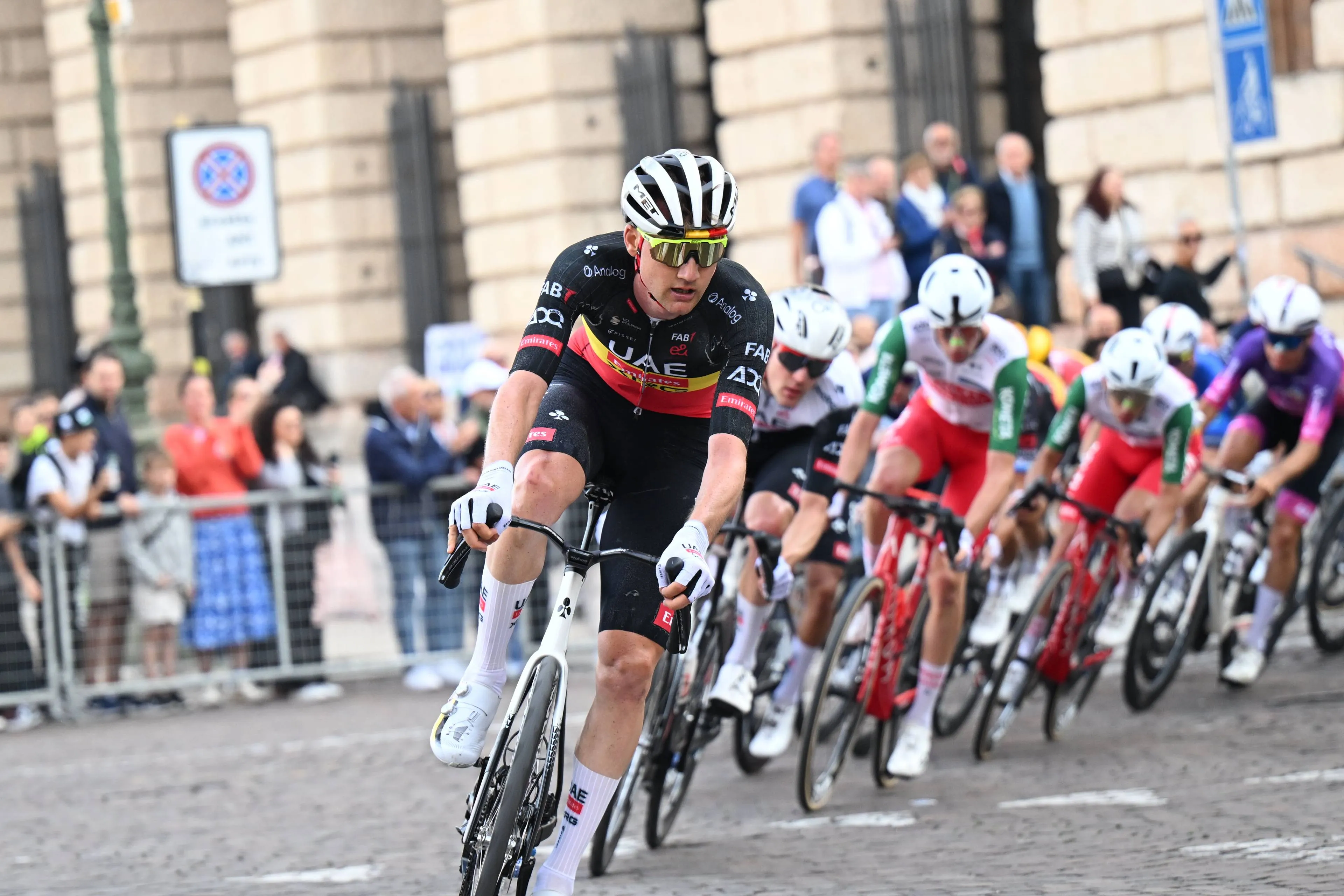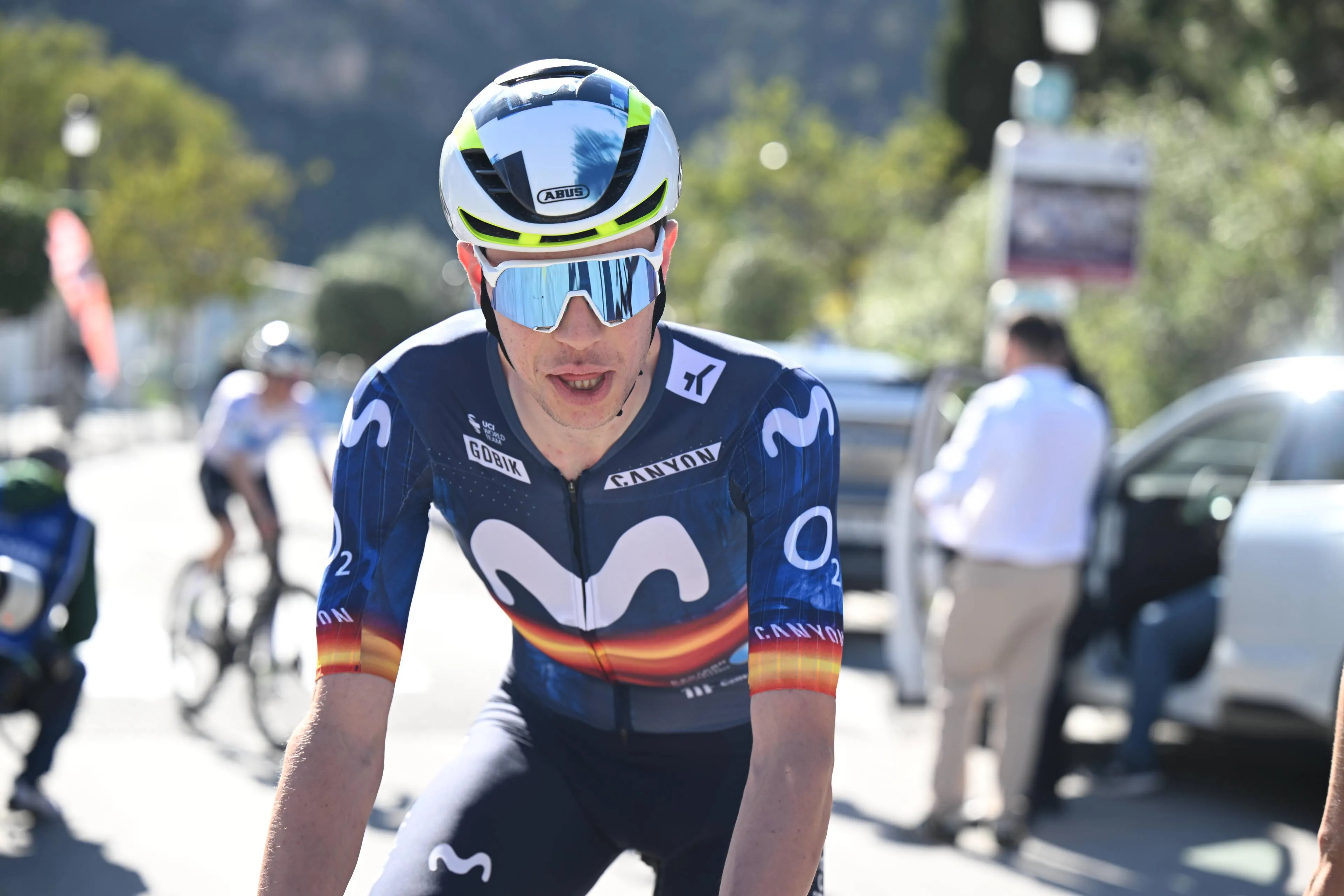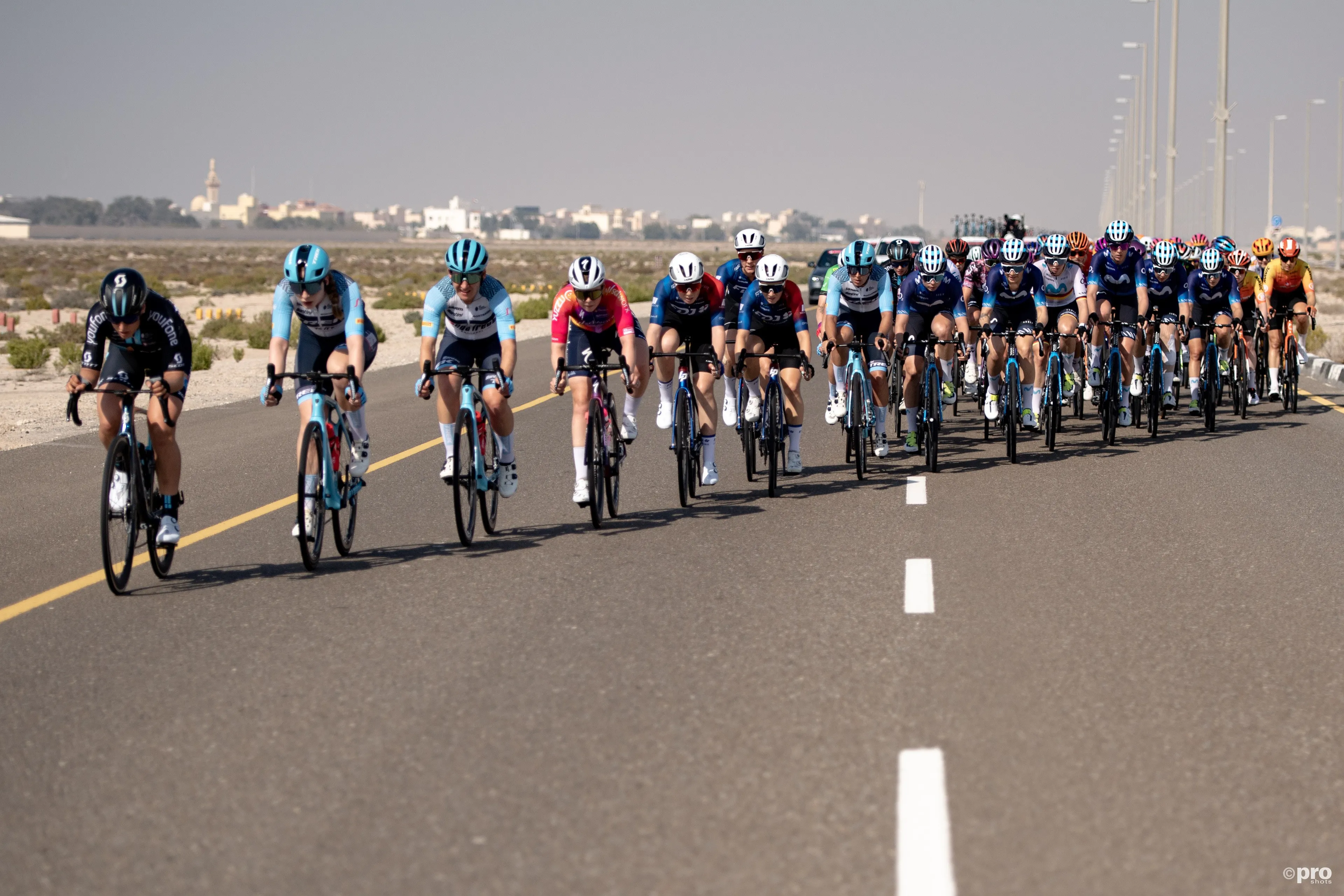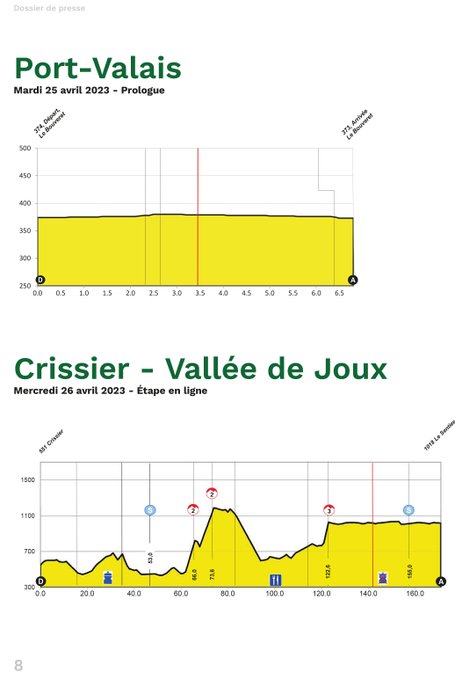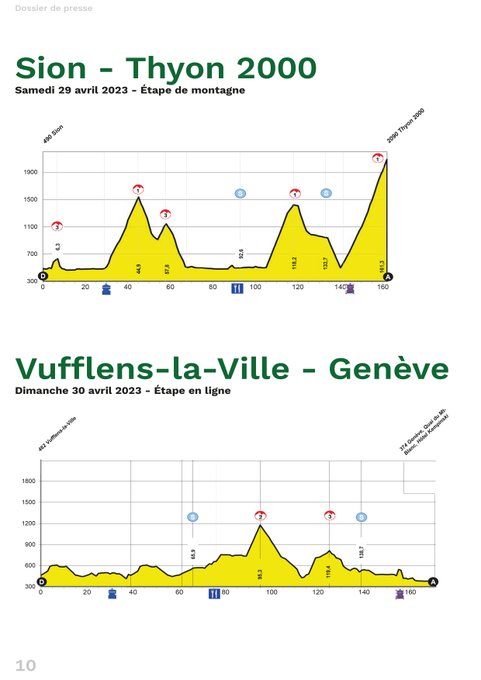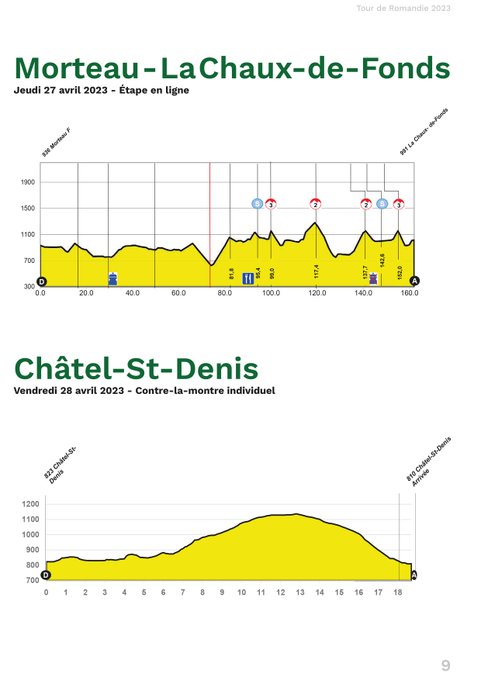
Profiles. From the 25th to 30th April 2023 the peloton will tackle the Swiss roads at the Tour de Romandie, on the French-speaking portion of the central European nation. It is a race that features opportunities for the time-trialists, sprinters, puncheurs and climbers, positioned between the spring classics and the Giro d'Italia.
With six stages on the road, two will be time-trials - with a prologue seeing the first leader's jersey given. The race provides terrain for different types of riders to succeed, however the main plot will be the fight for the overall classification which is set to implode in the Alps.
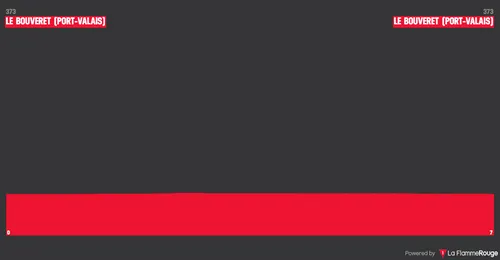
Prologue: Port-Valais - Port-Valais, 7 kilometers
The race starts off with a short prologue in the town of Port-Valais of just under seven kilometers. It won't create big differences, however it will set some order in the GC and provide a fair fight for the first lead of the race. The course is perfect for the powerhouse riders. There are two corners in the route where the riders will stop pedaling. Likely they won't need to use the brakes, it's a flat-out effort where pure speed is all that matters.

Stage 1: Crissier - Vallée de Joux, 169.4 kilometers
Stage one from Crissier to Vallée de Joux will see the riders tackle a rather hilly day, however one that's suited to the sprinters. It features three categorized climbs and no descent following the last, however it should be too far for any team to fully commit to preventing a bunch sprint.
It isn't an usual profile. The first half of the day features quite a tough ascent, that's split into two different categorized climbs. One is 4.5 kilometers long at 8%, and after a very small flat section the second part features 5.3 kilometers at 7.3%. The summit comes with just under 100 kilometers to go so there shouldn't be attacks, however it'll make it difficult to make for an organized chase.
Following a plateau and decent descent the riders head into another ascent which ends with 46.5 kilometers to go, it's 4.5 kilometers at around 6% average gradient. Again not a tough climb, but enough to put some fast men under difficulties if the pace is pushed. There is barely no descent afterwards, and the finale will take place al altitude in the Vallée de Joux.
The sprint finale, if it is to happen, should be normal however. The final corner comes with 2.3 kilometers to go which will string the peloton quite a bit, but from there on there are only a few slight changes of direction. The final kilometer is quite simple and flat, it should lead to a normal sprint.
Read also

Stage 2: Morteau - La Chaux-de-Fonds, 162.7 kilometers
Stage two from Morteau to La Chaux-de-Fonds is a traditional day in Romandie, in which the race will be very open. The climbers have their first opportunity to strike, however it is a day where the puncheurs should have the advantage, whilst the sprinters can't be discounted aswell taking into consideration how the race is ran. Aggressive racing is expected and many riders can succeed.
Three categorized climbs once the second half of the stage starts will make it difficult. The first half of the day is mostly flat, but then in quick succession we have 6.7Km at 6%, 1.5Km at 8.1% and 4.8%. Those will be a warm-up however, the major challenges will come afterwards.
The Col de la Tourne is the toughest climb of the day and summits with 25.5 kilometers to go. It's 4.4 kilometers long at over 7%, featuring gradients of 9% for a whole kilometer towards the end. It is still decently far away from the finish and this early on in the race it shouldn't see the GC fight open up, but it will burn through the peloton and provide a launchpad for attacks.
A third category, the most important climb of the day is likely Le Communal. Those who race Romandie frequently will know it, it's 1.5 kilometers long at 8.1% which is relatively constant. An explosive climb where gaps can certainly appear. It ends with 11.5Km to go and sees afterwards a very fast descent. Right after comes another hilltop which won't let the race settle much, new attacks could come with a whole kilometer at 6%.
It's not brutal but a launchpad, with no descent all the way into the finish. What follows is a pan-flat straightforward finale into La Chaux-de-Fonds for the final 5,5 kilometers.
Read also

Stage 3 (ITT): Châtel-St-Denis - Châtel-St-Denis, 18.8 kilometers
Before the mountains, the fourth stage of the race features over 18 kilometers of individual time-trial. It will be in Châtel-St-Denis that this will take place, it's a long time-trial for the race's size however not a flat one. It's a tricky day where the uphills and downhills will be a serious challenge and many riders can surprise.
It is absolutely a difficult effort to manage, an and unusual time-trial. The first five kilometers are mostly flat, but then lead to an inconsistent ascent where the main gaps of the day will be created. This one will go up to 13% near it's start, however most of the climb is within more gentle slopes where the TT bike will with no doubt be the better option.
The whole ascent is 4.3 kilometers long at 5.7% and summits with 8.5Km to go to the end of the effort. The riders find a plateau right after, before a classic Swiss descent. In the TT bikes it will be treacherous and incredibly nervous. The descent back into Châtel features gradients of over 10%, it's not a mostly straightforward descent with a couple of tricky corners, riders will need a lot of caution, only the final few hundred meters flatten out.
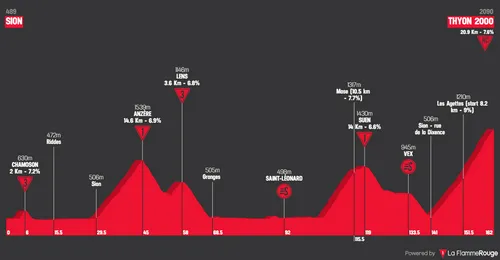
Stage 4: Sion - Thyon 2000, 162 kilometers
Whilst specific details are yet to be given, stage four of the race will be the queen stage. It is a classic aswell at the Swiss race, as the riders tackle the Rhône valley's many ascents, in a stage that culminates on the Thyon 2000 climb, where big gaps are expected. There is a total of over 4300 meters of climbing, and unlike last year the gaps will be made outside of the time-trials - on a day like this there is no hiding.
There is a 2-kilometer climb at over 7% near the start where the breakaway will likely get away. It needs to be a group of strong climbers if there is any ambition of surviving, as the riders will take on three long and difficult climbs within the Rhône valley. The first of which is Anzère, 14.6 kilometers at 7% that end with 117 kilometers to go. Another small ascent quickly follows, but the riders will then prepare for the second main climb.
Suen is another difficult challenge. Officially it's 14Km at 6.6% however the details of the climb hide an uglier truth, which is that it's last three kilometers are almost flat. Most of the ascent is in fact at a constant 8% and sees many hairpins. This one will end with 43 kilometers to go, however the difficulties that are still to come mean most will try to approach it conservatively.
The descent is split into two, however riders will be fighting for positioning into the second one, as it is quite technical and directly leads into the base of the final ascent. The riders have no time to calm down and prepare for Thyon 2000 in the valley, they immediately start climbing up it. However threats of an attack at the base aren't high as it's an effort of over 50 minutes.
The climb in total is 20.9 kilometers at 7.9% and is rather constant, the first half being mostly between 5 and 7%, but the second half featuring three tiny flat sections. The gradients will be higher however overall, exceeding 10% in some sections. The ascent goes all the way into 2090 meters of altitude, it's a proper high-mountain challenge and the gaps created at it's summit could prove decisive for the outcome of the race.

Stage 5: Vufflens-la-Ville - Genève, 169.7 kilometers
The final day of the race sees the most suiting day for the fast men. From Vufflens-la-Ville to Genève, the peloton will tackle a day that features two categorized climbs, however they should not be too hard or close enough to the finish to deal serious damage.
There is a hilltop right at the start of the day where those looking to succeed off a breakaway will try to escape right away and build a strong group. The profile is very suited for an escapee move, featuring these two ascents. Grand Fuey is the first of which, 5.8Km at 7.5% ending with 75 kilometers to the finish, which precede a long and steep descent.
Right as the descent ends, the riders take on the final climb of the day - and the race - which is Le Molard. It's 3.3 kilometers at 6.8%, not something to shrug off. The summit comes with 51 kilometers to the finish line but the summit of the climb is in theory a few kilometers after, as there will be some rolling terrain following.
The final 45 kilometers have a mostly downhill trend, descending 400 meters in altitude. They will be very fast and it'll be hard to bring back a group out front. However the roads won't be technical, and will lead into the center of Genéve. The finale will be fast, mainly with a tricky right-hander with 250 meters to go making it a sprint where being in the first positions is incredibly crucial.
Read also
Estimated start and finish times for Tour de Romandie stages:
Prologue: 14:50 - 17:30CET
Stage 1: 13:20 - 17:30CET
Stage 2: 13:25 - 17:25CET
Stage 3: 14:10 - 17:30CET
Stage 4: 10:55 - 15:50CET
Stage 5: 11:55 - 15:55CET
claps 2visitors 2
Just in
Popular news
Latest comments
- Minor flaws.... thats like suggesting Genghis Khan was a bit aggressive with other countriesslappers6619-02-2026
- Then you carry on if that's what makes you happyslappers6619-02-2026
- Fabio cannot catch a break.mij19-02-2026
- OK, today is the "air conditioner"... yesterday was a cramp... on saturday a bee will sting him in his tongue... his tongue will swell up and mustafa gets no oxygen. Because of his swollen tongue, Remco won't be able to give us a new excuse. Remco and the spanish rat Ayuso should be on the same team. They both have a ton of excuses and both of them are liars. Ad acta.Mou-Cro-HR19-02-2026
- Florian Lipowitz is secretly happy
 Rafionain-Glas19-02-2026
Rafionain-Glas19-02-2026 - The crucial thing to remember is that Remco was broken by the pace of Gall and Tiberi, not Del Toro's. Remco's excessive antics are because he doesn't want anyone to think that he's 'genuinely' struggling. You can always say 'he got cramps' because 'his preparation didn't go to plan', but the thing is that there is a limit to the number of excuses and exceptions that there can be. Eventually everyone just accepts that he's reached his ceiling on the climbs.
 Rafionain-Glas19-02-2026
Rafionain-Glas19-02-2026 - Bahraini suspicious..Santiago19-02-2026
- The problem is, a British 'boss' opening the gates, when the native workers not wanting them!
 leedorney19-02-2026
leedorney19-02-2026 - Who is overrating him on climbs? Everyone knows since ages it’s his weakness and needed years of work. Question us if he can do enough about it. For sure he won’t be able to improve his TT enough to compensate.Mistermaumau19-02-2026
- What do you call only seeing someone’s positives?Mistermaumau19-02-2026
Loading
#TDR2023: voilà les premiers aperçus du tracé. Avec une échappée belle à Morteau (F) pour l'étape des horlogers vers La Chaux-de-Fonds!
Write a comment

